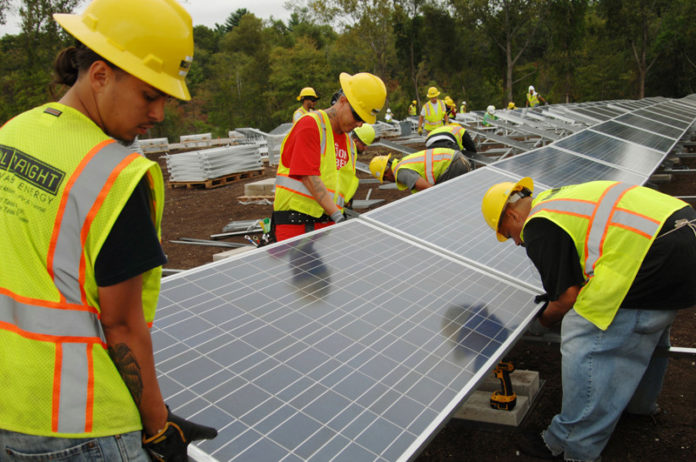
PROVIDENCE – The Trump Administration’s new tax on imported solar panels isn’t likely to shutter local businesses, but it could hurt the industry and falter in its design to bolster domestic manufacturing.
The new tax, designed to boost the American solar manufacturing industry, starts at 30 percent and falls 5 percent in each of the next three years. The impact will be felt locally, as most solar companies source cheaper material from outside the country where manufacturing is more established.
And for some, the new tariff isn’t likely to change that dynamic.
“Even with the tariff, the majority of imports will still be cheaper,” said Doug Sabetti, owner and founder of Newport Solar, a solar design and installation company.
In anticipation of the tax, Sabetti beginning last summer started stockpiling materials. The strategy has given him a one-year cushion to keep prices stable, and he’ll benefit from a slightly lower tax rate – 25 percent – when he starts placing orders again next year.
The effort, he estimated, will save him more than $50,000.
Anthony Baro, owner of E2SOL LLC in Providence, expects the tax to increase the cost of business by 10-15 percent. The pricing will inevitably trickle out to the customer, which he says will – in some cases – have a damaging impact on prospective clients.
“It’s going to spook some customers who are price sensitive,” he said.
Sabetti predicts the utility-scale and commercial markets will hurt the worst because solar panels are a much larger portion of the overall costs. For residential projects, solar panels are a smaller part of the overall cost, he added.
“The utility and commercial sectors will hurt much more,” he said.
Vito Buonomano III, owner of Northeast Solar & Windpower LLC in Providence, said his contractors have likewise stockpiled resources in anticipation of the tariff. But he expects it will inevitably hurt the industry, and he doesn’t see it as beneficial to domestic manufacturing.
“If the administration had any real interest in ramping up American manufacturing, they would have started out at 5 to 10 percent and then ramped it up. The way they’re doing it is obviously just to hurt the solar industry,” he said.
Two American manufacturers, Suniva and SolarWorld Americas, requested the tariffs, arguing cheap imports had nearly killed domestic manufacturing in recent years. But the solar industry overall is largely skeptical the tariff will result in an increase of domestic manufacturing jobs, as low-wage countries will maintain a competitive edge.
Conversely, the Solar Energy Industries Association on Monday said the new tax would result in a loss of about 23,000 solar industry jobs this year.
Sabetti expects the impact could push many – including himself – to eschew the American manufacturers, Suniva and SolarWorld, who are largely seen as hurting the overall industry.
“What these two companies have done is made themselves pariahs in the solar industry,” he said. “I would buy from SunWorld and Suniva only if they are the absolute last option.”
Eli Sherman is a PBN staff writer. Email him at Sherman@PBN.com, or follow him on Twitter @Eli_Sherman.












